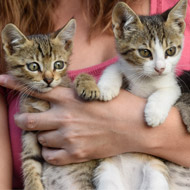Figures show scale of animal hoarding in the UK

The RSPCA has received more than 1,000 calls already this year in relation to animal hoarding.
New figures published by the RSPCA show that the charity has received more than 1,000 calls already this year in relation to animal hoarding.
RSPCA vet Kayleigh Hill is leading a scheme in Manchester to help those hoarding animals. She said that, since the scheme started, she and her team have visited 60 houses in the area, with each household having an average of 19 cats.
“What we want to do through this scheme is to go into people’s homes and help them,” she said. “I’m not interested in how many cats a person owns but rather how well they are able to cope and to look after them.
“We aren’t punishing people, we are working with them to reduce their animals to a number that is manageable for them. We take welfare scores of the cats each visit and what we are finding is that their scores are improving and are staying at that improved level.”



 The latest
The latest